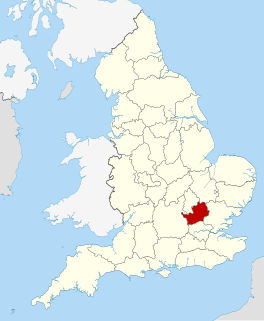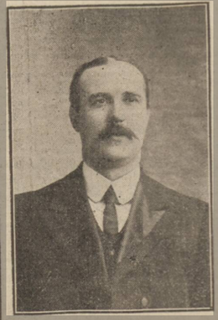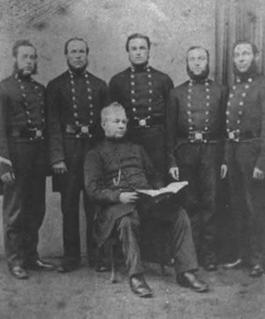
Frederick George Beale was a British police officer and Chief Constable.

Frederick George Beale was a British police officer and Chief Constable.
Beale was born in Monmouthshire in Wales in 1907. [1] He was the son of Frederick Charles Beale, a coal miner, and Edith Terrell. He was schooled at West Monmouth Grammar School until aged 17, and later studied at the South Wales School of Mines until aged 22. [2] He received three awards for distinction and a diploma in mining engineering, later becoming an Associate of the South Wales Institute of Engineers.
Beale joined the Brighton Borough Police in 1929 and performed commendable duties across multiple departments, eventually transferring to police headquarters in 1932, first as Aliens Officer and later in the same year a clerk to the chief officer, whilst still a Police Constable. [3] In March 1933 he passed the qualifying examinations to earn the promotion of Sergeant, scoring a top score of 91% and a transfer to the St Helens Police.
From 1933 to 1935 Beale was a staff officer to the Chief Constable of St Helens Police, and performed clerical duties and taking of charges. In 1934 he took an examination with the City of Liverpool Police and qualified for the rank of Inspector.
On 2 May 1935 he transferred to the King's Lynn Borough Police in Norfolk and became the deputy to the Chief Constable of the force, which consisted of 43 regulars and 120 members of the Special Constabulary. He also performed the duties required of him as an Inspector of Weights & Measures. In July 1938 he undertook a course in Air Raid Precautions at the Home Office School at Falfield, and in July 1939 he took a course in incendiary bomb control at the Home Office School in Nottingham. In August 1940 he took a course of instruction for operational control in air raid incidents, and was subsequently a qualified instructor in Air Raid Precautions. Amongst other qualifications, Beale was certified by the St John Ambulance Association and the Royal Life Saving Society.
In October 1941, the Chief Constable of Penzance Borough Police, Robert Cyril Morton Jenkins, resigned to take a post at the Folkestone Borough Police. Six candidates were reviewed by the Penzance Police Watch Committee, those being Inspector Beale, Inspector Butcher of Ramsgate, Inspector Cargill of Liverpool, Inspectors Yeoman and Hargreaves of Blackpool and Inspector Maxwell of Preston. Candidates were balloted, with numbers whittled down to three, with Beale getting the highest number of votes during the second round of balloting.
Beale led the force throughout the final years of the Second World War, although would be required to defer the running of the force to Cornwall Constabulary in 1943, as per the terms of the Defence (Amalgamation of Police) Act 1942, which was a temporary measure by the Home Office to allow the military to deal more easily with a smaller number of police forces. By 1946 though, the arrangement was still in effect, and on 1 April 1947 borough forces were abolished altogether with the passing of the 1946 Police Act.
Beale remained in charge of the Penzance district of the Cornwall County Constabulary, taking the rank of Superintendent.
Most of the police forces of the United Kingdom use a standardised set of ranks, with a slight variation in the most senior ranks for the Metropolitan Police Service and City of London Police. Most of the British police ranks that exist today were chosen by Home Secretary Sir Robert Peel, the founder of the Metropolitan Police, enacted under the Metropolitan Police Act of 1829. The ranks at that time were deliberately chosen so that they did not correspond with military ranking, because of fears of a paramilitary force.

Devon and Cornwall Police is the territorial police force responsible for policing the counties of Devon and Cornwall, including the unitary authority areas of Plymouth, Torbay and the Isles of Scilly.

Merseyside Police is the territorial police force responsible for policing Merseyside in North West England. The service area is 647 square kilometres with a population of around 1.5 million. As of September 2017 the service has 3,484 police officers, 1,619 police staff, 253 police community support officers, 155 designated officers and 208 special constables. In terms of officer numbers, the force is the 8th largest of the 48 police forces of the United Kingdom. However, in terms of geographic area of responsibility, it is the 3rd smallest of the territorial police forces after the City of London Police and Cleveland Police. The force is led by Chief Constable Andy Cooke.

Hertfordshire Constabulary is the territorial police force responsible for policing the county of Hertfordshire in England. Its headquarters is in Welwyn Garden City. From 2011-2016 the force was headed by Chief Constable Andy Bliss, the current Chief Constable is Charlie Hall QPM. The force consists of over 3,900 police officers and staff, supported by more than 410 special constables.

Durham Constabulary is the territorial police force responsible for policing the non-metropolitan county of County Durham and the unitary authority of Darlington. The force covers the 2,232 km² of the county which has a resident population of 595,308. It is one of the smaller forces of the 43 territorial police forces that service England and Wales. Durham is Home Office force 11.

Kent Police is the territorial police force for Kent in England.

Nottinghamshire Police is the territorial police force responsible for policing the shire county of Nottinghamshire and the unitary authority of Nottingham in the East Midlands of England. The area has a population of just over 1 million.
The Metropolitan Special Constabulary (MSC) is the part-time volunteer police force of the Metropolitan Police Service. It is one of three Special Constabularies operating within London, the others belonging to City of London Police and British Transport Police. The service was created over 180 years' ago under the Special Constables Act of 1831 and currently consists of 1,731 officers, making it the largest in the UK.
Head constable was a rank used in some British and British colonial police forces, and is still used in the Indian police.
Lionel Decimus Longcroft Everett OBE KPM was a British police officer who served as chief constable of Liverpool City Police from 1925 to 1931.
Liverpool Parks Police was a police force maintained by the Corporation of Liverpool to police the parks and open spaces owned by the City. The first record of "park constables" in Liverpool is from 1832, although members of the force were not sworn in as constables in their own right until 1882. The force was disbanded in 1972.

Robert Cyril Morton Jenkins, OBE, KPM, OStJ (1898–1973) was a senior British police officer. He served his entire working career in the force, save for a spell in the Army Infantry in the First World War, where he was a member of the Royal West Kent Regiment. Upon his retirement from the police in 1963, he had served 44 years. He was notable for opening an inquiry into serious allegations of misconduct by a number of officers of the Folkestone Borough Police at a time when Britain was suffering heavy bombing by the Luftwaffe and cross-channel shelling from occupied France.
The King's Birthday Honours 1941 were appointments in the British Empire of King George VI to various orders and honours to reward and highlight good works by citizens of various countries. The appointments were made to celebrate the official birthday of The King, and were published on 6 June 1941.
Penzance Borough Police was the police force for the borough and corporate town of Penzance, Cornwall, from 1836 to 1947. It was formed following the passing of the Municipal Corporations Act 1835, which reformed all UK boroughs, and stipulated that each appoint a Watch Committee to oversee a police force. The police force formed part of the commonality of the town's government, led by an elected Mayor, six aldermen and eighteen councillors.
Folkestone Borough Police was the borough police force for the town of Folkestone in Kent. It was formed in 1851 under the terms of the Municipal Corporations Act 1835.
Plymouth City Police was the city force for Plymouth, Devon, from 1928 to 1967. The force’s title was conferred upon it when the borough of Plymouth achieved city status in 1928.

Harry Kenyon (1871–1955) was a British police officer and Chief Constable, and served in the Oldham, Burnley and Penzance Borough Police forces from 1893 to 1937.

Truro City Police, known as Truro Borough Police until 1877, was the police force for the corporate town of Truro, Cornwall, from 1836 to 1921. It was established under the terms of the Municipal Corporations Act 1835 which required every town to appoint a council and a Police Watch Committee, which was responsible for overseeing a police force.
The 1939 New Year Honours were appointments by King George VI to various orders and honours to reward and highlight good works by citizens of the United Kingdom and British Empire. They were announced on 30 December 1938.